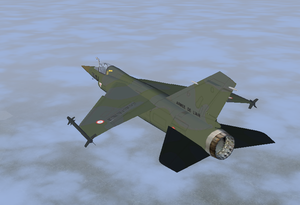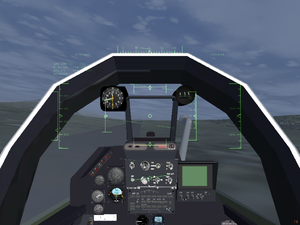Dassault Mirage F1
| Note A new version of the Mirage F1 is currently in development. |
 | |
|---|---|
 Dassault Mirage F1 at altitude. | |
 Dassault Mirage F1 cockpit with a custom compass. | |
| Type | Military aircraft, Interceptor aircraft, Fighter aircraft |
| Propulsion | Single-engine jet (Jet aircraft, Single-engine aircraft) |
| Author(s) |
|
| FDM | YASim |
| --aircraft= | Mirage_F1 |
| Status | Early production |
| Development | |
| Website |
|
| Repository |
|
| Download |
|
| License | GPLv2+ |
|
| |
The Dassault Mirage F1 is a French single seat, single engine fighter aircraft originally developed as a interceptor having a attack capability.
History
The Mirage F1 was based on the larger two seat, two engine, Dassault Mirage F2, which never entered production. The F1 first flew in December 1966 and deliveries to the French Air Force begun in May 1973. The last Mirage F1 built left the factory in 1990.
In total, more that 700 aircraft was built.
Versions
Apart from the original interceptor version (F1C), there are also a two seat trainer version (F1B), an improved interceptor with fixed refuelling probe (F1C-200), a tactical reconnaissance version (F1CR) and a ground attack version (F1CT), both based on the F1C-200. There are also numerous export versions as the Mirage F1 was quite an export success, with some of the bigger customers being Iraq (108 aircraft), Spain (73 aircraft), Morocco (50 aircraft), South Africa (48 aircraft) and Greece (40 aircraft).
Engine
With two exceptions all aircraft are equipped with a single shaft afterburning SNECMA Atar 9K50 turbojet engine. The two exceptions are one French aircraft fitted with a single shaft afterburning SNECMA M-53 turbofan, called Mirage F1M-53, and a South African aircraft fitted with a twin shaft afterburning Klimov RD-33 turbofan otherwise used in early MiG-29s. That aircraft was confusingly called the "Super Mirage", as the three first F1 preproduction aircraft was called "Super Mirage F.1".
Limitations
Air speed
Gear and flaps up:
Flap extension:
- 1/2 flaps < 300 KIAS
- Full flaps < 225 KIAS
Landing gear:
- Landing gear extended < 240 KIAS
Weight
- Maximum takeoff weight – 15 200 Kg
- Normal landing weight – 9 000 Kg
- Exceptional landing weight – 11 000 Kg
Rate of descent at touchdown
Maximum rate of decent at touchdown:
- 9 000 Kg - 450 ft/min
- 11 000 Kg - 350 ft/min
Other air speeds
- Rotation at 120 KIAS
- Lift off at 150 KIAS
Related content
External links
- The Dassault Mirage F1 by Greg Goebel.
- Mirage F1 Flight Manual and Checklist for a MS Flight Simulator model, but most probably based on South African flight manuals.
- Mirage F.1 Squadron Report, Flight International, 16 October 1975. (The link goes to a very narrow search of Flight Global's pdf archive.)
| |||||